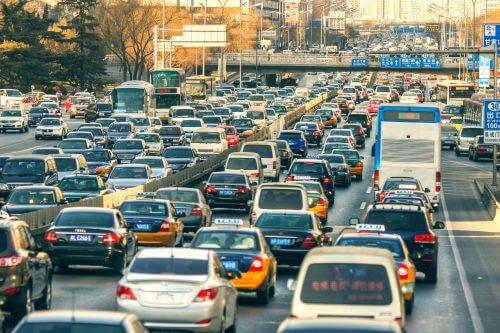Researchers at Tel Aviv University found an increase of over 50% in the risk of prostate, breast and lung cancer among heart patients exposed to a high level of traffic air pollution at their place of residence * The study reinforces the International Agency for Research on Cancer's declaration of traffic air pollution as a cause of cancer in humans * The study will be published In the September 2019 issue of the scientific journal for environmental research Environmental Research

A new study led by Prof. Yariv Gerber and PhD student Gali Cohen from the Department of Epidemiology and Preventive Medicine at Tel Aviv University's Faculty of Medicine, found a clear statistical relationship between chronic exposure to air pollution from transportation sources and an increase in the risk of several types of cancer and mortality in general among heart patients, who are considered a vulnerable population.
Prof. Ran Kornovsky from the Rabin Medical Center and Prof. David Brodai from the Technion are partners in the research. The research will be published in the September 2019 issue of the scientific journal Environmental Research.
The study was conducted with funding from the Cancer Society and the Foundation for Research in the Field of Environmental Quality and Epidemiology named after the late Israel Ya'akov and Laila Alter.
As part of the study, the researchers collected information on more than 12,000 patients, most of them residents of the center of the country, who underwent cardiac catheterization at the Rabin Medical Center between 2014-2004. Using the database of the National Cancer Registry at the Ministry of Health, the researchers discovered that over 700 of the patients developed cancer during the post-catheterization follow-up period, and approximately 3000 died. This information was cross-referenced with estimates of chronic exposure to traffic pollutants, which were obtained using two advanced mathematical models from the Technion and the Hebrew University.
"We used two models to increase the certainty of the findings" says doctoral student Gali Cohen. "The models are based on data from dozens of pollutant monitoring stations scattered throughout the country, and each model also takes into account additional data, such as traffic volumes, meteorology and geographic variables. We used them to estimate as accurately as possible the level of exposure at each subject's residential address to the concentrations of nitrogen oxides (NOx) in the air, which are considered a reliable measure of the level of traffic pollution. Since most of the patients were residents of the center of the country, the differences in exposure levels do not reflect living in different areas, but rather factors that may change even within the city itself, such as, for example, the proximity of the home to busy roads. In addition, we took into account personal and clinical characteristics of the participants, including smoking and socioeconomic status."
The findings revealed that high exposure (over 25 parts per billion) to nitrogen oxides from a transportation source is associated with a significant increase - at a rate of up to 1.56 times - in the risk of heart patients suffering from three types of cancer - prostate, breast and lung cancer. The higher the exposure, the higher the risk. Regarding other types of cancer, no such relationship was discovered. It is important to note that from the data of the Cancer Society and the Ministry of Health it appears that every year in Israel about 2,500 patients are diagnosed with lung cancer, about 5,500 breast cancer patients and about 2,000 prostate cancer patients. At the same time, according to the data of the Cardiology Association in Israel, about 20,000 patients are diagnosed here with myocardial infarction (heart attack) each year.
Gali Cohen summarizes: "Among the test population, we found close to 300 new cases of lung, breast and prostate cancer, and the models showed a significant and direct statistical relationship between high exposure to traffic pollution and the risk of developing the disease. The risk of mortality was also found to be related to traffic air pollution, but to a lesser extent. It is important to emphasize that this is an observational study that does not allow a definite inference about the existence of a causal relationship between air pollution and the health outcomes studied, as there may also be other explanations. However, the new study reinforces the International Agency for Research on Cancer's (IARC) announcement from 2013 about traffic air pollution as a cause of human cancer, as well as the position of the Israeli Ministry of Health, which in 2014 added exposure to air pollution and particulate air pollution to the list of factors known to be carcinogenic to humans. A person.

2 תגובות
In the government and the establishment, only the money is important, not the people, they continue to collect tax from the fuel and that is the most important thing
What about pollution from industry?